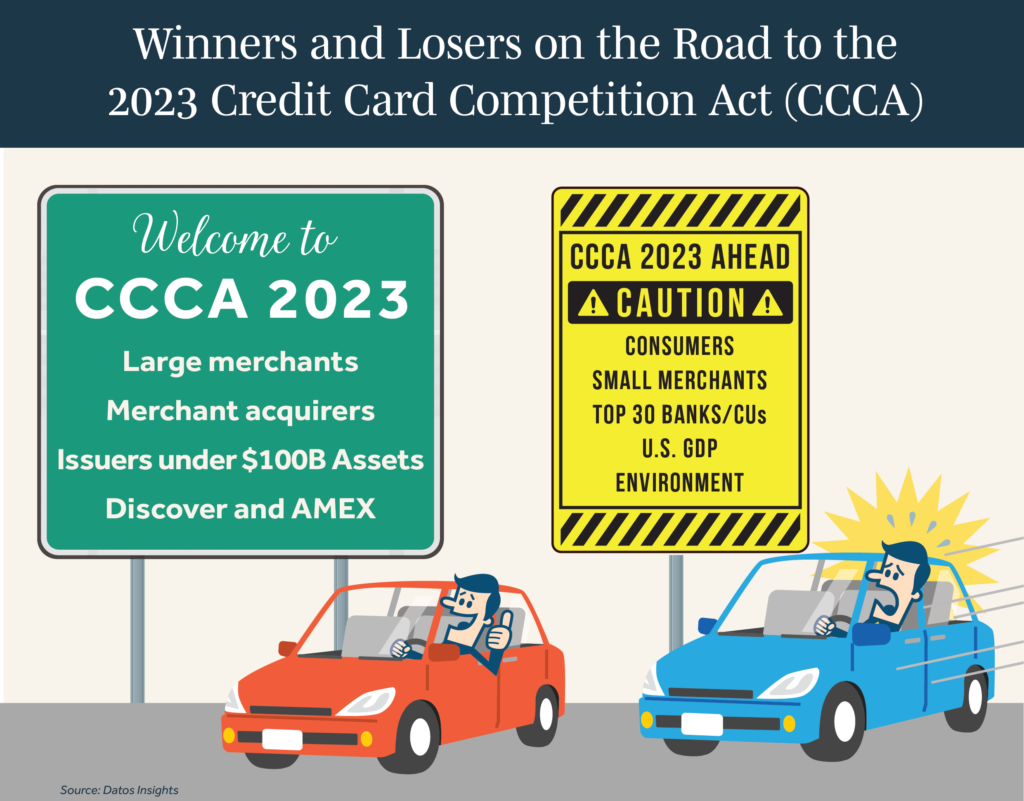Few people increase a card executive’s blood pressure more than Dick Durbin. He has had card interchange fees in his cross-hairs for over a decade and seems devoted to bringing these fees as close to break-even as possible. He and others in the Senate seem to have the interest of small merchants and consumers in mind, but they may not understand that interchange regulation is unlikely to help either party.
The winners and losers from this legislation will look much different than supporters of the CCCA realize.

Winners if the CCCA Passes
- Large merchants: Large merchants are the clear winner if the CCCA passes because any decrease in interchange expense can be used to boost net income. One only needs to examine how merchants responded to the original Durbin Amendment capping debit card interchange. A University of Chicago Law School study determined that merchants did not pass all of these savings to consumers in the form of lower prices.1
- Flat-rate merchant acquirers: Merchants continued to pay the same percentage rate for transaction processing after the Durbin Amendment cap on debit cards and will continue paying the same rate after any decrease in credit card interchange to banks. A lower interchange rate will create a higher spread for flat-rate merchant processing fees, resulting in higher income for these organizations.
- Card-issuing banks and credit unions with under US$100 billion in assets: About 30 banks and credit unions are large enough to be affected by this legislation, which could negatively impact credit card profitability and their ability to support rewards. This could allow the remaining banks and credit unions to offer greater rewards and benefits to cardholders than their larger competitors and gain a competitive advantage for co-branded card relationships and BIN sponsorships.
- Discover and American Express card networks: The CCCA requires a secondary credit card network, and Discover and American Express are the most obvious choices. If the CCCA passes, these card networks will be added to millions of credit cards almost overnight.
- Any bank with a card network: The CCCA carves out an exception where card networks that are also issuers are not required to have a secondary card network (and are also not precluded from having one). This exception could motivate a large bank to launch a proprietary credit card network. Achieving the merchant coverage of the four largest credit card networks would be challenging. However, a loophole may exist for banks to issue XYZ-Bank-labeled credit cards with another major card network as the secondary network.
Losers if the CCCA Passes
- Consumers: According to research sponsored by Wells Fargo, seventy-one percent of U.S. consumers have at least one credit card with rewards.2 History from other jurisdictions that capped interchange shows that rewards dry up quickly. In many cases, incremental fees hit consumers as issuers seek ways to backfill the lost interchange revenue and maintain marginal profitability. Consumers are also unlikely to benefit from lower prices because merchants are not charities. Management, especially at publicly traded companies, are obligated to act in the best interests of their shareholders, which means any expense savings will benefit their bottom lines and not pass to consumers in the form of lower prices.
- Small merchants: Small merchants will lose the most if the CCCA passes. Not only are they unlikely to benefit from lower interchange rates compared to larger merchants, but multiple studies have found credit card rewards to influence consumers to spend more than cash or non-rewards cards. This means small merchants could see the ticket size for credit card sales decrease as those consumers are less motivated to spend more.
- About thirty banks and credit unions: Some will argue that the CCCA will impact all banks and credit unions, and perhaps it could. However, this contradicts the proposal language and what Dick Durbin has stated publicly. As written today, this legislation will only require FIs with over US$100 billion in assets to add a secondary card network (of their choosing) to the card. This change is expected to decrease their interchange income and be expensive to implement.
- The U.S. gross domestic product: Multiple studies have shown that credit card rewards cause consumers to spend more than they would with cash or non-rewards cards, and this higher spending will likely outweigh the savings the CCCA may offer merchants. Therefore, any reduction in rewards will result in a decrease in consumer spending.
- The environment: Thirty banks and credit unions may sound small, but they represent millions of credit cards in the market. Adding another card network will require the replacement of those cards because they impact the EMV chip and contactless antennae in the physical card. In other words, the CCCA will push tons of PVC waste to landfills around the U.S. and force the industry to introduce tons of new PVC plastic into the market.
No Impact From the CCCA
- Small businesses with a flat-rate merchant processing agreement: Many micro and small businesses have flat-rate merchant processing agreements (e.g., US$0.10 plus 3% of the transaction) that will remain unchanged no matter how low interchange rates fall.
- PIN networks: PIN networks would love to be a secondary card network. However, given their history of driving interchange as low as possible with new products like online and offline PINless, it is unlikely any bank or credit union will choose them as a secondary network.
For more information on this topic, contact me here.
- David S. Evans, Howard H. Chang, Steven Joyce, “The Impact of the U.S. Debit Card Interchange Fee Caps on Consumer Welfare: An Event Study Analysis,” The University of Chicago Law School, October 2013, accessed November 10, 2023, https://chicagounbound.uchicago.edu/law_and_economics/652/ ↩︎
- “New Study: Americans Lean Into Credit Card Rewards to Offset Rising Costs – Including Travel,” Wells Fargo, August 2, 2022, accessed November 3, 2023, https://newsroom.wf.com/English/news-releases/news-release-details/2022/New-Study-Americans-Lean-Into-Credit-Card-Rewards-to-Offset-Rising-Costs–Including-Travel/default.aspx ↩︎

